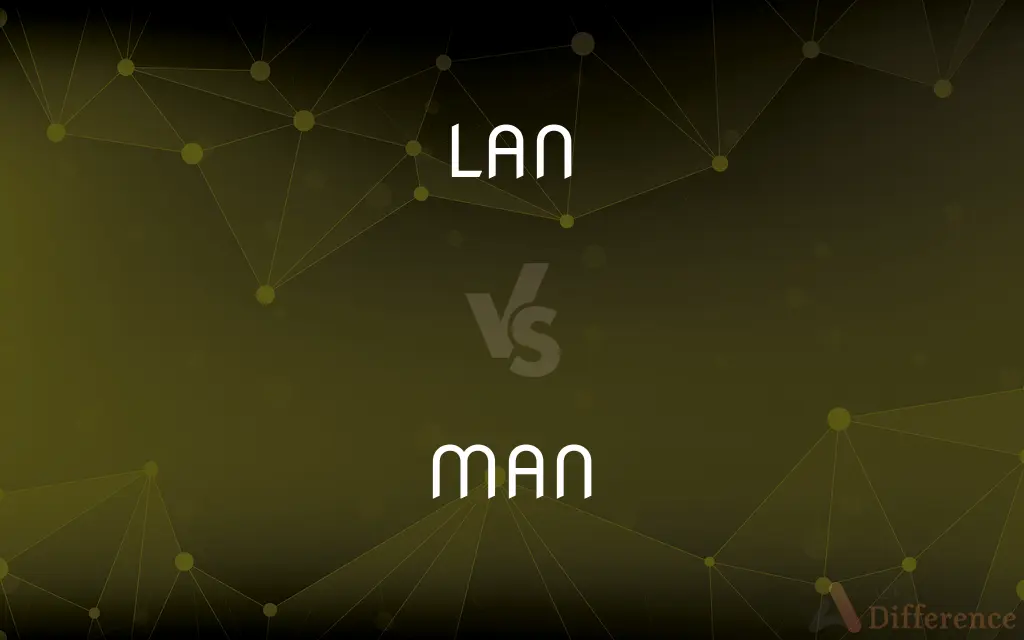LAN vs. MAN — What's the Difference?
By Tayyaba Rehman & Urooj Arif — Published on January 31, 2024
LAN (Local Area Network) connects devices within a small, localized area; MAN (Metropolitan Area Network) spans a larger area, covering a city or campus.

Difference Between LAN and MAN
Table of Contents
ADVERTISEMENT
Key Differences
LAN, or Local Area Network, is a network that connects computers and devices in a limited area such as a home, school, or office building. MAN, or Metropolitan Area Network, extends over a larger geographic area than a LAN, typically encompassing a city or a large campus.
The key characteristic of a LAN is its private ownership and its restriction to a smaller geographical area, making it ideal for sharing resources like files and printers within a building. In contrast, a MAN covers a larger area than a LAN and can provide internet connectivity for multiple buildings or an entire city.
LANs usually operate at higher speeds compared to MANs due to shorter distances and fewer devices connected. MANs, however, have to manage a larger network with more traffic, which may affect speed and requires more robust infrastructure and management.
While LANs are commonly used for connecting personal computers and workstations in office environments, MANs are typically employed by Internet Service Providers to connect several LANs in a metropolitan area, offering broader network access.
Security in a LAN is generally easier to manage due to its limited size and access. MANs face more complex security challenges as they interconnect a larger number of networks and span public areas, necessitating advanced security protocols.
ADVERTISEMENT
Comparison Chart
Coverage Area
Small, localized areas (buildings, homes)
Larger areas (cities, large campuses)
Speed
Generally higher due to shorter distances
Can be slower due to longer distances
Ownership
Typically private (businesses, homes)
Often public or operated by ISPs
Usage
Sharing resources within close proximity
Connecting multiple LANs, broader access
Security Management
Relatively simpler due to smaller scale
More complex due to larger scale, public access
Compare with Definitions
LAN
A network covering a small geographic area, like an office.
Our office's printers are connected through a LAN.
MAN
Used by ISPs to provide internet services over a city.
The local ISP manages a MAN to deliver high-speed internet.
LAN
Used for internal communication within a single building or campus.
The company's LAN facilitates quick data transfer between departments.
MAN
Offers broader network coverage for urban areas.
The metropolitan hospital network is connected through a MAN.
LAN
A private network for connecting devices in close proximity.
We set up a LAN for our home gaming setup.
MAN
A network spanning a city or large campus for connectivity.
The city's public Wi-Fi is part of a larger MAN.
LAN
A network architecture designed for small-scale connectivity.
Our LAN allows employees to collaborate efficiently on projects.
MAN
Connects multiple LANs over a metropolitan area.
The university's campuses are interconnected through a MAN.
LAN
Connects computers within a localized setting for resource sharing.
The school's computers use a LAN to access shared educational materials.
MAN
A network designed for larger areas than LAN but smaller than WAN.
Our company's branches in the city are connected via a MAN.
LAN
A system that links together electronic office equipment, such as computers and printers, and forms a network within an office, building, or group of buildings
LAN
A local area network; a network{3} connecting computers and word processors and other electronic office equipment within a small area, to create an inter-office system, typically within one building or one site of a corporation. Contrasted to WAN, a wide-area network.
LAN
A local computer network for communication between computers; especially a network connecting computers and word processors and other electronic office equipment to create a communication system between offices
Common Curiosities
What does MAN stand for?
MAN stands for Metropolitan Area Network.
Are LANs faster than MANs?
Generally, LANs are faster due to shorter distances and fewer connected devices.
Is setting up a LAN expensive?
Setting up a LAN is relatively inexpensive and straightforward.
Can LANs connect buildings across a city?
No, LANs are limited to a small area, like a single building or campus.
What does LAN stand for?
LAN stands for Local Area Network.
What is the primary use of a LAN?
It's used for connecting devices in a small, localized area for resource sharing.
How large is a MAN's coverage area?
A MAN typically covers a city or a large campus.
Who typically manages a MAN?
MANs are often managed by Internet Service Providers or large organizations.
How does a MAN benefit a city?
A MAN can provide widespread internet access and interconnect public services.
Can a MAN connect multiple LANs?
Yes, MANs are used to connect several LANs over a metropolitan area.
Can a LAN be used in a home setting?
Yes, LANs are commonly used in homes for connecting personal devices.
Can a LAN and a MAN be interconnected?
Yes, LANs can be interconnected through a MAN for broader network access.
Do LANs need an Internet connection to function?
No, LANs can function without the Internet for internal networking.
What kind of security does a MAN require?
MANs require more advanced security due to their larger scale and public access.
What kind of maintenance does a MAN need?
MANs require regular maintenance and management due to their complexity.
Share Your Discovery

Previous Comparison
Cellpadding vs. Cellspacing
Next Comparison
Gasoline vs. KeroseneAuthor Spotlight
Written by
Tayyaba RehmanTayyaba Rehman is a distinguished writer, currently serving as a primary contributor to askdifference.com. As a researcher in semantics and etymology, Tayyaba's passion for the complexity of languages and their distinctions has found a perfect home on the platform. Tayyaba delves into the intricacies of language, distinguishing between commonly confused words and phrases, thereby providing clarity for readers worldwide.
Co-written by
Urooj ArifUrooj is a skilled content writer at Ask Difference, known for her exceptional ability to simplify complex topics into engaging and informative content. With a passion for research and a flair for clear, concise writing, she consistently delivers articles that resonate with our diverse audience.












































